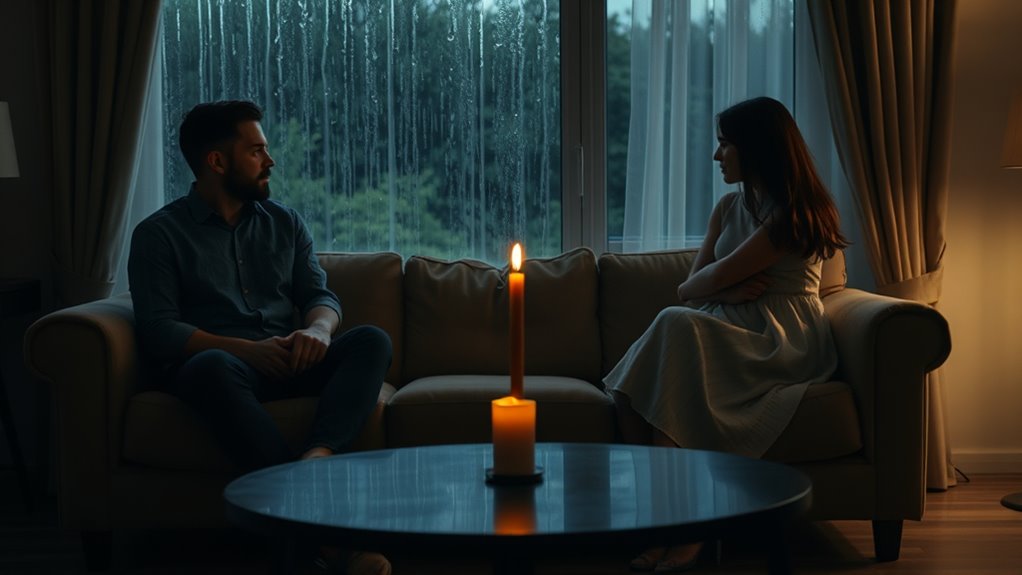If you notice persistent conflicts, communication barriers, or emotional disconnection, it may be time to contemplate couples therapy. Signs include frequent arguments, unresolved issues, or a lack of intimacy, which can lead to frustration and resentment. External stressors like trauma or major life changes can also impact your relationship’s health. Addressing these concerns early shows commitment and can prevent further damage. Continue exploring to discover how professional guidance can help you rebuild and strengthen your bond.
Key Takeaways
- Frequent or escalating conflicts that lead to communication barriers and misunderstandings.
- Noticeable decline in intimacy or emotional closeness causing loneliness or rejection.
- Repeatedly cycling through unresolved arguments without resolution or growth.
- External stressors like trauma, illness, or major life changes impacting your relationship.
- Recognizing issues early, such as communication or intimacy problems, to prevent relationship breakdowns.

Couples therapy can be a valuable resource when you and your partner face persistent conflicts or feel disconnected from each other. When communication barriers develop, it becomes harder to share your feelings openly, leading to misunderstandings and frustration. These barriers might include avoiding important conversations, misinterpreting each other’s words, or feeling like your partner isn’t really listening. Over time, such communication struggles can erode the trust and closeness you once had, making it difficult to reconnect. If you notice that arguments become more frequent or escalate quickly, it’s a clear sign that professional help might be needed to break down these barriers and rebuild effective communication. Additionally, addressing underlying issues like conflict resolution skills can significantly improve relationship dynamics.
Persistent conflicts and communication barriers signal that couples therapy could help rebuild trust and understanding.
Intimacy issues also often signal that couples therapy could be beneficial. When physical or emotional closeness wanes, it can create feelings of loneliness or rejection. These problems might manifest as a lack of desire, feeling distant even in shared moments, or avoiding intimacy altogether. Sometimes, intimacy issues stem from unresolved conflicts or stress, but they can also be rooted in underlying emotional disconnection or past wounds that aren’t being addressed. If you find yourselves avoiding intimacy or feeling unsure about how to reconnect physically and emotionally, therapy can provide a safe space to explore these barriers without judgment. A therapist can help identify patterns that contribute to intimacy struggles and teach you new ways to foster closeness.
Another indicator to deliberate therapy is when conflicts seem cyclical or unresolved. If you keep revisiting the same arguments without finding resolution, it suggests underlying issues aren’t being addressed. These recurring conflicts can lead to feelings of frustration, resentment, and emotional fatigue. A therapist can facilitate better understanding and help you develop healthier conflict resolution skills, breaking the cycle of argument and reconciliation.
You might also find it helpful to seek therapy if either of you has experienced a significant life change or trauma that impacts your relationship. Stressors like job loss, illness, or family crises can strain even the strongest couples. A professional can support both of you in dealing with these challenges and maintaining a healthy connection despite external pressures.
Ultimately, recognizing when to seek couples therapy isn’t about waiting until things are completely broken. It’s about acknowledging that some issues, like communication barriers and intimacy problems, are difficult to resolve alone. Reaching out for help shows strength and a commitment to growing together, ensuring your relationship remains resilient and fulfilling.
Frequently Asked Questions
Can Couples Therapy Fix Every Relationship Issue?
Couples therapy can considerably improve many relationship issues, but it doesn’t fix every problem. If you’re struggling with trust rebuilding or seeking to enhance marital satisfaction, therapy offers valuable tools and guidance. However, success depends on both partners’ commitment and openness. While it can address deep-rooted conflicts and foster understanding, some issues may require additional support or may not be fully resolvable.
How Long Does Couples Therapy Typically Last?
Couples therapy usually lasts about 8 to 20 sessions, but it depends on your unique issues. Sessions typically run 45 to 60 minutes, and therapy frequency can start weekly or bi-weekly. Think of it like a Netflix binge—sometimes you finish quickly, sometimes it’s a long, slow process. The key is consistency and patience, because lasting change rarely happens overnight, even if it feels like a season finale.
Is Couples Therapy Effective for Long-Term or Recurring Problems?
Couples therapy can be effective for long-term or recurring problems when you focus on building emotional resilience and improving communication skills. By actively working through issues with a therapist, you strengthen your relationship’s foundation, making it more resilient to future challenges. Consistent therapy helps you both develop better understanding, patience, and problem-solving skills, which are essential for maintaining a healthy relationship over time, even through recurring difficulties.
What Should I Do if My Partner Refuses Therapy?
If your partner refuses therapy, focus on improving communication and addressing emotional distancing. Express your feelings calmly and listen actively to their concerns. Show empathy and patience, emphasizing how therapy could benefit both of you. Respect their boundaries while sharing your needs. Sometimes, individual counseling can also help you manage communication barriers and emotional distance, which might encourage your partner to contemplate joining you later.
Are There Alternative Methods if Couples Therapy Isn’T Working?
If couples therapy isn’t working due to communication barriers or emotional distance, consider alternative methods like workshops, self-help books, or online courses focused on relationship skills. You can also try individual counseling to address personal issues affecting the relationship. Prioritize open, honest conversations and practice active listening. Sometimes, taking a break or engaging in shared activities can reignite emotional connection, helping you both work through challenges outside traditional therapy.
Conclusion
Recognizing when to seek couples therapy can genuinely transform your relationship. If you find yourselves stuck in recurring arguments, feeling disconnected, or struggling to communicate effectively, professional help might be the key. Some experts believe that addressing issues early can prevent long-term damage, suggesting that therapy isn’t just for crises but also for strengthening bonds. Trust your instincts—seeking support can be a proactive step toward building a healthier, more fulfilling partnership.









